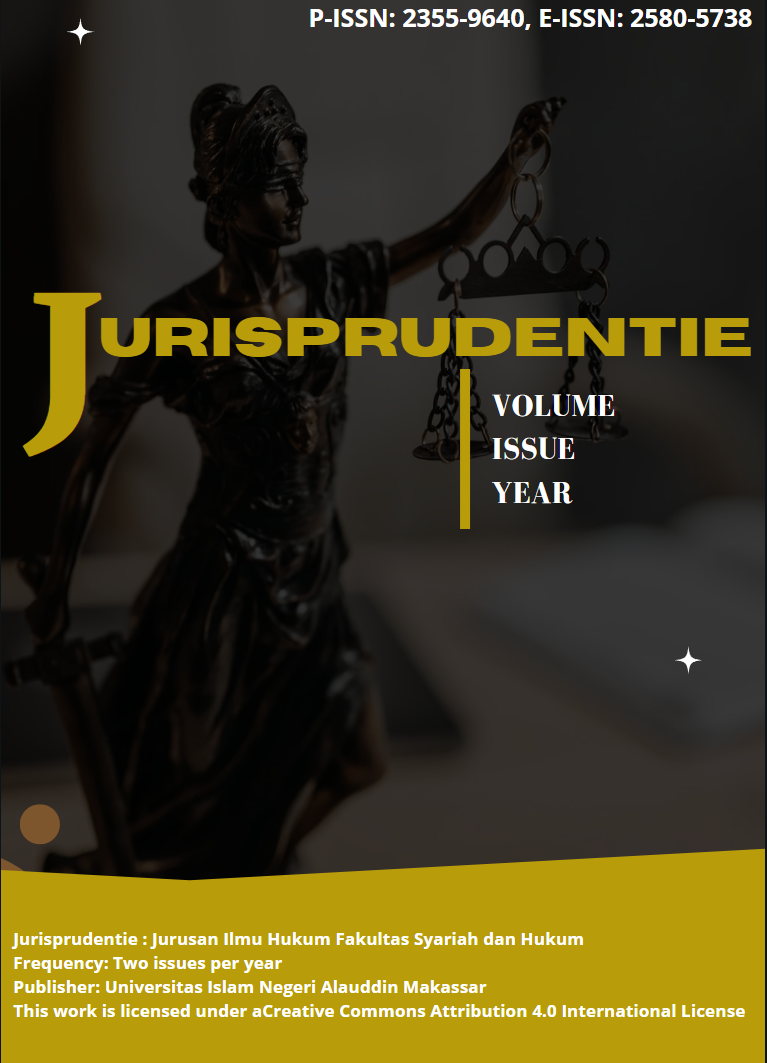Exclusionary Rule As The Defendant's Rights In Criminal Jurisdiction
Abstract
The exclusionary rule is basically one of the principles that developed along with the development of criminal evidence law, especially in countries with anglo-Saxon legal traditions. The principle that emphasizes the exclusion or exclusion of evidence obtained unlawfully in the criminal justice process has over time become a procedural element that supports the creation of a fair trial for the Defendant. The right to a fair trial is a right that must be guaranteed by the State and does not only concern the right to be tried by an independent and impartial court. Indonesia as a state of law that tries to balance the public interest in law enforcement with the interests of the suspect or defendant in a fair judicial process unfortunately has not regulated exclusionary rule in its criminal procedural law. In fact exclusionary rule is one of the instruments for recovery in the event of a violation by law enforcement officials, especially in the process of obtaining evidence. Through research conducted using this normative legal research method, the author wants to place the exclusionary rule not only as a principle but also as a defendant's right in the criminal justice process as an inseparable part of the right to a fair trial so that it is urgent to be accommodated in the agenda of procedural law reform. Indonesian crime.
References
Journal
Alexandre Chitov, “The Concept of Truth And Fairness In Thai Criminal Procedure”, New Criminal Law Review Volume 24 Nomor 1, (2021).
Álvaro Paúl, “Admissibility of Evidence Before the Inter-American Court of Human Rights”, Revista Direito GV Volume 13 Nomor 2, (2017).
Basri, Hasan. "Perlindungan Hukum terhadap Pelaku Tindak Pidana berdasarkan Sistem Peradilan Pidana Indonesia." SIGn Jurnal Hukum 2.2 (2021):
George P. Fletcher, “Justice and Fairness in the Protection of Crime Victims”, Lewis & Clark Law Review Volume 9 Nomor 3, (2005).
Malau, Agustina. Eksistensi Peradilan In Absentia dalam Sistem Hukum Acara Pidana dan Relevansinya dengan Hak Terdakwa untuk Melakukan Pembelaan. Diss. Universitas Islam Riau, 2017.
Matthew Robinson dan Marian Williams, “The Myth of Fair Criminal Justice System”, Justice Policy Journal Volume 6 Nomor 1, (2009).
Mindaugas Simonis, “Effective Court Administration and Profesionalism of Judge as Necessary Factors Safeguarding the Mother of Justice - The Right to a Fair Trial”, International Journal for Court Administration Volume 10 Issue 1, (2019).
Muntolib, Ahmad, and Sri Endah Wahyuningsih. "Peran Bantuan Hukum dalam Proses Peradilan Pidana di Kabupaten Blora." Jurnal Hukum Khaira Ummah 12.3 (2017).
Rohman, Arif. "Perlindungan hukum terhadap terdakwa salah tangkap dalam sistem peradilan pidana." Jurnal Komunikasi Hukum (JKH) 3.1 (2017).
Robert Doya Nanima, “Evaluating the jurisprudence of the African Commission on evidence obtained through human rights violations”, De Jure Law Journal, (2020).
Shiddiq, Farhan Ridhwan, and Sholahuddin Harahap. "Perlindungan Hukum Atas Hak Terdakwa untuk Didampingi Penasehat Hukum dalam Mememenuhi Hak Hak Terdakwa." Prosiding Ilmu Hukum (2018).
Book
Bassiouni, M. Cherif, International Criminal Law. Second Revised Edition, Leiden: Martinus Nijhoff Publishers, 2014.
European Court of Human Rights, Guide on Article 6 of the European Convention on Human Rights - Rights to a Fair Trial, Strasbourg: Council of Europe, 2021.
Gregory, Roy, dan Philip Giddings dalam Richard Bellamy and Alex Warleigh (eds.), Citizenship and Governance in the European Union, London dan New York: Continuum, 2001.
Hidayat, Nurkholis, dan Restaria F. Hutabarat, ed.., Mengukur Realitas dan Persepsi Penyiksaan di Indonesia, Jakarta: The Partnership for Governance Reform, 2012.
Human Rights Committee, General Comment No. 32 - Article 14: Rights to Equality Before Courts and Tribunals and to a Fair Trial, Geneva: United Nation Human Rights Committee, 2007.
Ross, Jacqueline, dan Stephen C. Thaman, Comparative Criminal Procedure, Massachusetts: Edward Elgar Publishing, 2016.
Tiara, Ayu Eza, Arif Maulana, dan Muhammad Retza Billiansya, Kepolisian Dalam Bayang-Bayang Penyiksaan (Catatan Kasus Penyiksaan Sepanjang Tahun 2013 sd 2016), Jakarta: Lembaga Bantuan Hukum (LBH) Jakarta, 2016.
van Kempen, PHPHMC, ed.., Criminal Law and Human Rights, Burlington: Ashgate Publishing Company, 2014.
Vriend, Koen, Avoiding a Full Ceriminal Trial: Fair Trial Rights, Diversions, and Shortcut in Dutch and International Criminal Proceedings, Berlin: Springer dan Asser Press, 2016.
Working Group on the Advocacy against Torture, Indonesia Pro Penyiksaan: 16 Tahun Pasca Ratifikasi Konvensi Anti Penyiksaan di Indonesia - Catatan Untuk Peringatan Hari Anti Penyiksaan Internasional 2014, Jakarta: Working Group on the Advocacy against Torture, 2014.
Regulations
Universal Declaration of Human Rights.
International Covenant on Civil and Political Rights.
Universal Declaration of Human Rights.
International Covenant on Civil and Political Rights.
European Convention on Human Rights.
The American Convention on Human Rights (Pact of San José).
The African Charter on Human and Peoples Rights (Banjul Charter).
The Resolution on the Right to Recourse and a Fair Trial (Tunis Resolution).
The Dakar Declaration and Recommendations on the Right to a Fair Trial in Africa (Dakar Declaration).
The Guidelines and Measures for the Prohibition and Prevention of Torture, Cruel, Inhuman or Degrading Treatment or Punishment in Africa (Robben Island Guidelines).
The Principles and Guidelines on the Right to a Fair Trial and Legal Assistance in Africa.
Undang-Undang Dasar Negara Republik Indonesia Tahun 1945.
Undang-Undang Republik Indonesia Nomor 39 Tahun 1999 tentang Hak Asasi Manusia.
Evidence Act 1995.
Rancangan Kitab Undang-Undang Hukum Acara Pidana.
Once an article was published in the journal, the author(s) are:
- to retain copyright and grant to the journal right licensed under Creative Commons License Attribution that allows others to share the work with an acknowledgement of the work's authorship.
- permitted to publish their work online in third parties as it can lead wider dissemination of the work, with an acknowledgement of its initial publication in this journal
- continue to be the copyright owner and allow the journal to publish the article with the CC BY license
- receiving a DOI (Digital Object Identifier) of the work.


